|
|
|
Sort Order |
|
|
|
Items / Page
|
|
|
|
|
|
|
| Srl | Item |
| 1 |
ID:
193213
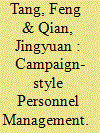

|
|
|
|
|
| Summary/Abstract |
The anti-corruption campaign launched by General Secretary Xi Jinping has been one of the most far-reaching bureaucratic overhauls in modern Chinese history. How has Xi's crackdown on corruption shaped bureaucratic selection at the sub-provincial level? In this paper, we find that the purge has influenced how local ties are weighed in the appointment of prefecture city leaders. While it is common for provincial Party chiefs to appoint locally embedded officials to govern localities without high-profile corruption cases, they tend to appoint outside officials without local experience and connections to manage cities whose ex-leaders have recently been prosecuted for corruption. We argue that the provincial leaders’ objective of installing non-local officials is to exert hierarchical control and oversight in localities affected by corruption. Using an original dataset of all Party secretaries from China's 287 prefecture-level cities between 2013 and 2020, we find a significant divergence in the local embeddedness of officials who are appointed to replace corrupt ex-leaders and the embeddedness of those who fill the vacancies of transferred or retired predecessors. Our study sheds light on how Xi's anti-corruption campaign has reshaped the central–local relations and the logic of political control in China.
|
|
|
|
|
|
|
|
|
|
|
|
|
|
|
|
| 2 |
ID:
185621
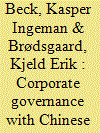

|
|
|
|
|
| Summary/Abstract |
This article analyses the role of the Chinese Communist Party (CCP) in the corporate governance of Chinese state-owned enterprises (SOEs), including a case study of a central-level SOE holding group. Relying on official documents, secondary literature and interviews with enterprise managers, government officials and academics, the article documents how the CCP has actively formalized its role in Chinese business by embedding itself in the corporate governance structure of SOEs. Through the application of Chinese indigenous administrative corporate governance concepts such as “bidirectional entry, cross appointment” and “three majors, one big,” the CCP has consolidated its dominance of enterprise decision-making procedures and personnel appointment and created a hybrid, Party-led model of corporate governance. While this hybrid model can secure enterprise compliance, communication with higher state and Party organs, as well as long-term development planning, it is unlikely to help solve SOE efficiency problems and may even undermine other SOE reforms.
|
|
|
|
|
|
|
|
|
|
|
|
|
|
|
|
| 3 |
ID:
159824
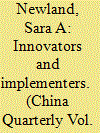

|
|
|
|
|
| Summary/Abstract |
Early literature on China's civil society focused on organizations’ autonomy from the state. However, the precise ways in which these organizations are dependent on the state – and on individual officials – are less well understood. I argue that NGOs depend on different types of officials whose career incentives vary, with significant implications for relationships with non-state actors. One set of officials, innovators, seeks rapid promotion and uses civil society partnerships to gain higher-level attention. Innovators’ career goals lead them to provide support for NGOs; however, excessive reliance on innovators can force organizations to stray from their mission and can weaken their long-term position in a given locality. A second set of officials, implementers, seeks stability and security. Cognizant of the risks of partnering with non-state actors, these officials are sometimes forced by their superiors to engage with NGOs but see little personal benefit in doing so. These findings suggest the importance of China's multilevel political structure for state–society relations.
|
|
|
|
|
|
|
|
|
|
|
|
|
|
|
|
| 4 |
ID:
178173
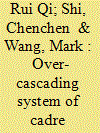

|
|
|
|
|
| Summary/Abstract |
China’s cadre evaluation system – the personnel management system used to assess the performance of government officials in the party-state – is considered an important tool for upper-level governments to supervise and regulate lower-level agents. This system is one of the key factors contributing to the Chinese Communist Party’s (CCP) authoritarian resilience. Deficiencies of this system are exemplified by the ‘blind pursuit of GDP’, selective implementation, gaming, collusion, and data fabrication. The CCP has been reforming this system to strengthen its monitoring and political control over local government cadres, especially at the county level, and it is a crucial component in the step-by-step hierarchical power structure. While current literature focuses largely on the assessment content of such reform, this article pays specific attention to the changes in the cascading evaluation structure of province to prefecture to county. The article identifies a new dynamic of ‘over-cascading’ whereby provincial governments bypass prefectural governments and directly evaluate county officials, resulting in the co-existence of prefecture-county and province-county evaluations. This article also explores the functioning mechanism of this dual structure and argues that this structural change in the cadre evaluation system is breaking the traditional hierarchical governance structure and enhancing authoritarian resilience of the CCP because it provides a new route for over-cascading governance between provincial and county governments. This research contributes to the conceptualization of the over-cascading governing structure of the CCP and fills gaps in the literature on structural changes in China’s cadre evaluation system.
|
|
|
|
|
|
|
|
|
|
|
|
|
|
|
|
| 5 |
ID:
142567


|
|
|
|
|
| Summary/Abstract |
The implementation of China's reform era target-based cadre evaluation system has instigated various types of gaming behaviour on the part of local officials. How do these gaming strategies differ from each other? Why do local officials sacrifice the public interest for target fulfilment in some cases but not in others? This article argues that gaming is not monolithic and should not be treated as such. It develops a typology that distinguishes between pernicious and benign gaming, and looks into the symptoms and motives of pernicious gaming in particular. It finds that the distinct design of the measurement system – the combination of result-oriented targets imposed from above and high-powered incentives for target fulfilment – induces pernicious gaming. In addition, the system's implementation practically compels local officials to misrepresent their performance, even though they are aware of the negative impact of such behaviour on the public interest. This study shows that to understand the strategies, motivations and implications of gaming better, a more nuanced approach is needed.
|
|
|
|
|
|
|
|
|
|
|
|
|
|
|
|
| 6 |
ID:
184086
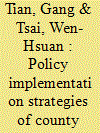

|
|
|
|
|
| Summary/Abstract |
Using the concept of ‘hedging’, we explore how local cadres in China deviate from central policies in order to serve local interests and, while doing so, avoid being called to account by their superiors. Political signals enable cadres to decide when to invest more resources into the implementation of certain policies. In this way, they optimize their performance and avoid the political risks involved in failing to carry out their designated tasks. This article uses county Y as an example in a discussion of county-level implementation of policies related to economic growth and air pollution control. We find that local cadres weaken the functions of the superior ‘special inspection team’ (专项督察组, hereafter inspection team), treating them as political instruments used by the central and local authorities to ensure a greater level of responsiveness at the grass roots. Information concerning the imminent arrival of an inspection team in their locality acts as a signal for cadres to allocate more resources to the enforcement of air pollution control measures, thus maximizing their performance in this area. Through this research, we have endeavoured to provide a deeper understanding of the operating logic of Chinese local governments and the behaviour of county cadres.
|
|
|
|
|
|
|
|
|
|
|
|
|
|
|
|
| 7 |
ID:
159823
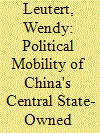

|
|
|
|
|
| Summary/Abstract |
Extensive research on the political mobility of Chinese officials at central, provincial, municipal and county levels has yet to fully consider an important group of elites – the leaders of China's core central state-owned enterprises (SOEs). This paper presents the first systematic analysis of their political mobility between 2003 and 2012 using an original biographical dataset with 864 leader-year observations. Under the Hu Jintao administration, these leaders emerged as a distinctive group within China's top political elite: increasingly well-educated but lacking experience beyond state-owned industry, with both lengthening leadership tenures and years of previous work in their companies. Instead of a “revolving door” through which these individuals rotate routinely between state-owned business and the Party-state to positions of successively higher rank, a top executive posting was most often a “one-way exit” to retirement. Of those who advanced politically, virtually all were transferred laterally along three career pathways with little overlap: to other core central SOEs; provinces; and the centre. This paper underscores the theoretical importance of disaggregating types of lateral transfer to research on Chinese officials’ political mobility and the cadre management system.
|
|
|
|
|
|
|
|
|
|
|
|
|
|
|
|
| 8 |
ID:
119180
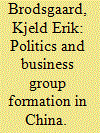

|
|
|
|
|
| Publication |
2012.
|
| Summary/Abstract |
As a result of economic reform and administrative restructuring in China, a number of powerful state-owned business groups ("national champions") have emerged within sectors of strategic importance. They are headed by a new corporate elite which enjoys unprecedentedly high levels of remuneration and managerial independence from government agencies and which derives legitimacy from symbolizing China's economic rise. However, through the nomenklatura system, the Party controls the appointment of the CEOs and presidents of the most important of these enterprises and manages a cadre transfer system which makes it possible to transfer/rotate business leaders to take up positions in state and Party agencies. In order to conceptualize the coexistence of the contradicting forces for further enterprise autonomy and continued central control that characterizes the evolving relationship between business groups and the Party-state, this paper proposes the notion of integrated fragmentation.
|
|
|
|
|
|
|
|
|
|
|
|
|
|
|
|
| 9 |
ID:
151579
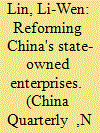

|
|
|
|
|
| Summary/Abstract |
The Chinese Communist Party has recently unveiled its new agenda for state-owned enterprise (SOE) reform. Most attention to date has focused on structural reform through the so-called “mixed ownership” policy. This article is to direct attention to a critically important yet much less analysed item on the SOE reform agenda: the professionalization of the SOE executive personnel. This article provides an empirical study on the managerial elite of China's financial and non-financial SOEs. The findings suggest a politically constrained management approach in the Chinese state-owned sector. Moreover, an innovative analysis of the SOE executive career patterns reveals that the state-controlled banks and industrial SOEs employ divergent human resource management methods. The anatomy of the SOE managerial elite in this article provides a timely evaluation of the recent SOE reform policy and a richer understanding of China's state-owned sector from a comparative capitalism perspective.
|
|
|
|
|
|
|
|
|
|
|
|
|
|
|
|
| 10 |
ID:
178884
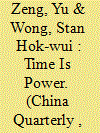

|
|
|
|
|
| Summary/Abstract |
Whether local officials in China are promoted on a meritocratic basis has been the subject of long-standing debate. Merit is commonly gauged by a leader's ability to deliver local GDP growth. Although some find economic performance to be a strong predictor of the career success of local leaders, we argue that the existing measure, which focuses on the promotion outcome of a single career step, is problematic because the career success of individual local leaders is seldom determined by a single promotion, or the lack thereof. We propose an alternative measure that is more suitable for China's political context: the length of time until promotion. Analysing the time it takes to gain promotion for four types of local leaders, we find that good economic performance is associated with a shorter time until promotion. However, the cumulative time-reducing effect of economic performance is far from significant, as it is generally insufficient to help local leaders overcome the age ceiling for promotion.
|
|
|
|
|
|
|
|
|
|
|
|
|
|
|
|
| 11 |
ID:
146611


|
|
|
|
|
| Contents |
Employment of women officers in the Indian Armed Forces is no longer an issue to be trifled with. Their track record in the areas of expertise that they have been employed in so far clearly indicates they have performed admirably and in fact, evinces a great degree of confidence in the organisation. Their employment as SSC officers effectively fills the void of officer shortages at the cutting edge and must be reinforced. The policy of their employment, however, must be enunciated unambiguously so that they are aware of future prospects and what their genuine
and legitimate expectations must be. Terms and conditions to include career management, enhancement, postings, privileges and constraints must be spelt out clearly and explained prior to their signing on the dotted line at the time of joining, lest there be any disappointment at a later stage. This will be also prevent unnecessary litigation.
|
|
|
|
|
|
|
|
|
|
|
|
|
|
|
|
|
|
|
|
|